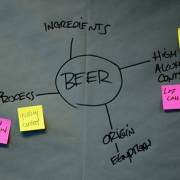3 Simple Steps to Becoming a Better Improviser
With the hustle and bustle of everyday life, it’s not uncommon to see people with days, weeks, even months planned out in advance. I’m guilty of this and, and even though it can be stressful, it’s something I’m rather proud of.
Why? Because I believe that my healthy obsession with organization, combined with my trusty sidekick—a meticulously color-coordinated Google calendar—give me the super heroic powers I need to conquer my professional and personal worlds.
And I’m pretty sure there are plenty of other organization-loving planners out there just like me. After all, experts are continually telling us that organization is they key to thriving in our increasingly hectic world. Yet, even an admitted organizational fanatic like myself has to wonder if there is such a thing as being too organized.
I started thinking about this more a few months ago when I read Improvise: Unconventional Career Advice from an Unlikely CEO by Fred Cook, CEO of Golin, a global public relations firm. Cook believes “the ability to improvise is a survival skill that will set young professionals apart from the pack and help them get ahead of the competition.”
But, how does an organized, planned-out person learn to become more comfortable with improvising? While I recommend that you read Cook’s book for his numerous tips and entertaining stories, these are the three lessons that resonated with me the most.
1. Be collaborative
This should be the first thing anyone looking to improve their improvisational skills does. Like anything else in life, no one can suddenly master the art of improvisation all by themselves. Behind every successful person is a team of smart, dedicated people who helped him or her get there. So, before you embark on a new adventure or challenge yourself to be bold, it’s critical to enlist an effective network of people you can trust to help you and push you when needed. This support system will hold you accountable and give you the encouragement and advice you need to sharpen your improvisational skills.
2. Be bold
Have a crazy idea for a new product? Pitch it. Want to get opinions or advice from an executive at your company? Connect with them. Are you the most junior person at the meeting? Speak up. Success favors the bold. Displaying confidence and fearlessly sharing your out-of-the-box ideas will help you stand out and get noticed as a thought-leader and valuable asset to the team. It may not be easy at first—especially if you are an uber-organizer like me who prefers to have everything fully thought out and buttoned up—but the more you do it, the more comfortable you’ll become.
3. Be adventurous
Get out of the country. Yes, I mean it. You have to leave. Why? To open your mind! Nearly 29 percent of Americans have never travelled overseas. That’s nearly one-third of our country that has never experienced another way of life. Study after study shows that travelling and experiencing other cultures is one of the best ways to open your mind and increase your creativity. Not only that, no matter how much you plan and prepare, travelling to unfamiliar surroundings will always present you with ample situations where you are forced to improvise and think on your feet. I went on two study-abroad trips in college and, to this day, I still draw on those experiences to help me think and improvise effectively at work everyday.
Don’t have the resources for an international adventure? No worries, you can still experience many of the same benefits by immersing yourself in unfamiliar settings and experiences closer to home.
To be clear, I’m not recommending that you completely throw out your planner and dive headfirst into the deep end of improvisation. (On the other hand, if you want to, go ahead and do it!) But, if you’re like me and want to become a better improviser while still maintaining a healthy dose of organization and planning in your life, I urge you to simply focus on these lessons and commit to gradually implementing more improvisation in your everyday life. I promise you, it will open you to rewarding new thoughts, experiences and successes that you would have never experienced before.
Do you have any tips on how super planners can become better improvisers? I’d love to hear them. Connect with me in the comments below!
Stephanie Neiheisel is an Associate Project Director at Seed Strategy where she specializes in transforming the nuances of consumer motivation into the foundation for strong, meaningful ideas.
Connect with us! Follow Seed Strategy on our LinkedIn, Twitter, Facebook and Instagram.





